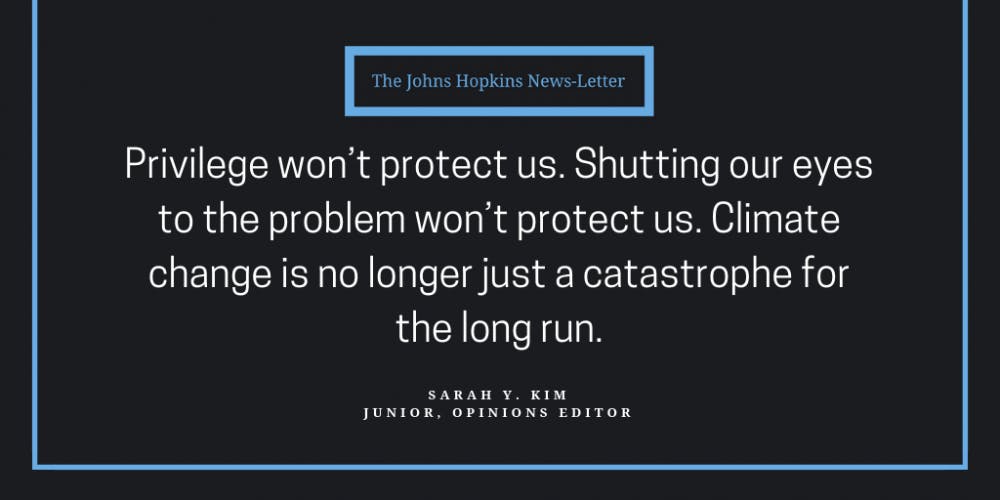Unless you’re a die-hard Republican or Trump supporter, chances are you believe in climate change. And if you’ve managed to tear your eyes off the disheartening flood of “Kavanaugh wins!” headlines, you’ll know that it’s escalating faster than we thought it was.
On Monday, the UN-convened (United Nations) Intergovernmental Panel on Climate Change released its most alarming climate change report to date. The report shows that if we keep up the current rate of greenhouse gas emissions, we’ll find ourselves in a crisis by 2040: wildfires, famines, severe droughts, the mass extinction of species and coral reefs and ensuing poverty and political instability on an unprecedented global scale.
We’ve already observed the effects of climate change on our globe, with rising sea levels submerging bodies of land and deadly droughts (one triggered the Syrian Civil War). This isn’t just a fight for future generations or for those in poorer communities or countries with little to no infrastructure. For hundreds of millions of people, and for much of our generation, it’ll be a fight for our own survival.
Privilege won’t protect us. Shutting our eyes to the problem won’t protect us. Climate change is no longer just a catastrophe for the long run. And unless we take some costly, implausible measures, like dramatically reducing the world’s population or putting a stopper on the economy, it looks like the fight against climate change is not one that we can win.
That doesn’t mean, however, that there’s no point in fighting. On the contrary, it’s more imperative than ever that we do so. We might not be able to stop climate change, but we must do what we can to mitigate its effects.
For at least two more years, it seems unlikely that the U.S. will do anything but aggravate the status quo. Our president believes climate change is a hoax and is practically the only world leader who thinks so. He withdrew from the Paris Agreement, and under his administration, the Environmental Protection Agency (EPA) has been lowering Obama-era restrictions on greenhouse gas emissions. But he will not be in power forever. And if we vote and make our voices heard this year, his party will not have to be either.
As Hopkins students, we should also be asking: Will the University do anything in light of the UN’s report?
In December 2017, the University’s Board of Trustees divested from thermal coal companies. But it continues to invest millions of dollars in fossil fuel industries. Hopkins may brand itself as a progressive institution, and it may contribute to climate change and sustainability research. But when it comes to combatting climate change, the University is all too passive.
Full divestment from fossil fuel industries is long overdue. For years, Hopkins students have demanded that the University divest its shares in these industries. For years, Refuel Our Future organized, undertook painstaking research, held rallies and sit-ins, and devoted precious time, energy and resources in the hopes that its efforts would pay off. In return, the Board did the bare minimum and congratulated itself for doing so.
Will the University act now? What will it take for the Board of Trustees to fulfill Refuel’s demands? If this report is not enough to make the Board reconsider full divestment, I’m not sure what will.
It’s not just people in power, however, that we must hold accountable. However obstructive our political leaders and bureaucracies may be, fighting climate change is also a bottom-up process.
To begin with, we must continue to push forward our demands. At Hopkins, this would mean continuing to pressure our administrators. It may be months since Refuel has held a rally, but that does not mean that the fight for divestment is over.
As students, we must also follow through our activism with action. Most of us currently live lifestyles that will not be sustainable in the long run. It’s more urgent now than ever that we’re finding ways to reduce our carbon footprints, be it taking public transport, reducing our meat consumption or buying local.
I won’t sugarcoat the truth, however, which you may have already registered: We lost. A long time ago. Climate change will culminate in disaster, sooner or later. But if we take action, we can delay disaster, and in that time we can perhaps curb the worst of climate change’s effects. Maintain the status quo, and there’s no hope — we’ll reap the consequences in a couple of decades. And the consequences will be steep.
Sarah Y. Kim is a junior majoring in Writing Seminars and International Studies from Walnut Creek, Calif. She is the Opinions Editor.





